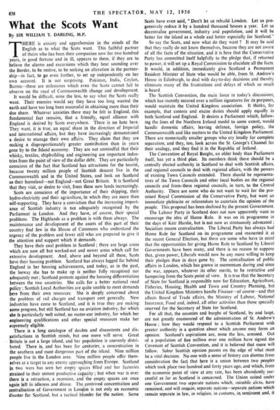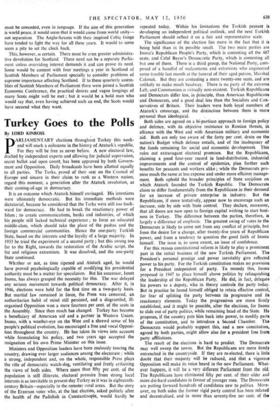What the Scots Want
By SIR WILLIAM Y. DARLING, M.P.
THERE is anxiety and apprehension in the minds of the English as to what the Scots want. This faithful partner of theirs who has been their companion now for two hundred years, in good fortune and in ill, appears to them, if they are to
believe the alarms and excursions which they hear sounding over the Border, to be restive, to be seeking an alteration in the partner- ship—in fact, to go even further, to set up independently on her own account. It is not surprising. Pakistan, India, Ceylon, Burma—these are milestones which even the Scots cannot fail to observe on the road of Commonwealth change and development. It would be difficult, none the less, to say what the Scots really want. Their enemies would say they have too long wanted the earth and have too long been successful in obtaining more than their due share. Whatever anxieties there may be felt in England, this fundamental fact remains, that a friendly, equal alliance with England is desired by Scots everywhere. There is no hate here.
They want, it is true, an eqna: share in the direction of Imperial and international affairs, but they have increasingly demonstrated a desire to manage their own affairs. They claim that they are making a disproportionately greater contribution than in years gone by to the Island economy. They are not unmindful that their whisky, textiles, shipbuilding and engineering are important indus- tries from the point of view of the dollar debt. They are particularly conscious of the fact that Scotland has attractions for the tourist, because twenty million people of Scottish descent live in the Commonwealth and in the United States, and look on Scotland as their homeland—not England—not Great Britain. It is Scotland that they visit, or desire to visit, from these new lands increasingly.
Scots are conscious of the importance of their shipping, their hydro-electricity and their agriculture, in which they are more than self-supporting. They have a conviction that the increasing import- ance of Scottish industry is not adequately recognised by the Parliament in London. And they have, of course, their special
problems. The Highlands as a problem is with them always. The maintenance and development of the assets of this part of their country find few in the House of Commons who understand the urgency of the problem and fewer still who are prepared to give it the attention and support which it demands.
They have their coal problem in Scotland ; there are large areas which are now all but worked-out and newer areas which call for extensive development. And, above and beyond all these, Scots have their housing problem. Scotland has always lagged far behind England in her housing achievements, and today, as in the past, the leeway she has to make up is neither fully recognised nor
adequately met ; Scotland protests against the housing differentiation 1,etween the two countries. She calls for a better national road
policy ; Scottish Local Authorities are quite unable to meet demands
here from their own resources. She is deeply concerned about the problem of rail charges and transport cost generally. New industries have come to Scotland, and it is true they are making some progress, but still Scotland has no aviation industry, for which the is particularly well suited, no motor-car industry, for which her engineering qualifications and other special resources make her supremely eligible.
There is a long catalogue of doubts and discontents and dis- Fatisfactions in Scottish minds, but one more will serve. Great Britain is not a large island, and her population is unevenly distri- buted. There is, and has been for centuries, a concentration in the southern and most dangerous part of the island. Nine million people live in the London area. Nine million people offer them- selves as a target to any enemy approaching from Europe. Scotland in two wars has seen her empty spaces filled and her factories grained to their utmost productive capacity ; but when war is over !here is a retraction, a recession, and the empty spaces are once again left in idleness and disuse. The contrived concentration and centralisation of Government in London is not only an economic disaster for Scotland. but a tactical blunder for the nation. Some Scots have even said, "Don't let us rebuild London. Let us pro- gressively reduce it by a hundred thousand houses a year. Let us decentralise government, industry and population, and it will be better for the island as a whole and better especially for Scotland."
So say the Scots, and now what do they want ? It may be said that they really do not know themselves, because they are not aware of all the facts of the situation, and it is here that the Conservative Party has committed itself helpfully to the pledge that, if returned to power, it will set up a Royal Commission to elucidate all the facts. It would, in addition, immediately give Scotland a Permanent Resident Minister of State who would be able, from St. Andrew's House in Edinburgh, to deal with day-to-day decisions and thereby eliminate many of the frustrations and delays of which so much is heard.
The Scottish Convention, the main force in today's discussions, which has recently secured over a million signatures for its purposes, would maintain the United Kingdom association. It thinks, for example, that custom and excise duties should apply equally in both Scotland and England. It desires a Parliament which, follow- ing the lines of the Northern Ireland model to some extent, would handle domestic affairs, leaving defence, foreign policy, the Commonwealth and like matters to the United Kingdom Parliament. There are numerically smaller groups who cry loudly for complete separation, and they, too, look across the St. George's Channel for their analogy, and they find it in the Republic of Ireland.
The Convention of Royal Burghs, an older body than Parliament itself, has yet a third plan. Its members think there should 'be a centrally elected authority in Scotland to deal with Scottish affairs, and regional councils to deal with regional affairs, with the powers of existing Town Councils extended. There should be representa- tives of the Town Councils and other local bodies on the regional councils and from. these regional councils, in turn, to the Central Authority. There are some who do not want to wait for the pro- mised Royal Commission of the Conservative Party, but want an immediate plebiscite or referendum to ascertain the opinion of the people. This proposal has been declined by the present Government.
The Labour Party in Scotland does not now apparently want to encourage the idea of Home Rule. It was on its programme in the days of Keir Hardie, but is not now as strenuously advocated ; Socialism means centralisation. The Liberal Party has always had Home Rule for Scotland on its programme and reasserted it at the recent General Election, but there are some who have in mind that the opportunities for giving Home Rule to Scotland by Liberal Governments have been many, and there is no reason to suppose that, given power, Liberals would now be any more willing to keep their pledges than in days gone by. The centralisation of public affairs in London, which has grown in momentum during and since the war, appears, whatever its other merits, to be restrictive and hampering from the Scots point of view. It is true that the Secretary of State for Scotland is responsible now for Education, Agriculture, Fisheries, Housing, Health and Town and Country Planning, but the United Kingdom Ministers handle Finance—of course—and that affects Board of Trade affairs, the Ministry of Labour, National Insurance, Food and, indeed, all other activities than those specially reserved for the Secretary of State for Scotland.
Far all that, the counties and burghs of Scotland, by and large, are not greatly enamoured of the administration of St. Andrew's House ; how they would respond to a Scottish Parliament with greater authority is a qutstion about which anyone may form an opinion. Scotland's aspirations are, none the less, aroused. Out of a population of flaw million over one million have signed the Covenant of Scottish Convention, and it is believed that more will follow. Sober Scottish opinion pauses on the edge of what must be a vital decision. No one with a sense of history can dismiss from consideration the fact that here is a union between two peoples which took place two hundred and forty years ago, and which, from the economic point of view at any rate, has been abundantly suc- cessful as far as Scotland is concerned. The Union united under one Government two separate nations which, mirabile dictu, have remained, and will remain, separate nations—separate nations which remain separate in law, in religion, in customs, in, sentiment and. it must be conceded, even in language. If the aim of this generation is world peace, it would seem that it would come from world unity— not separation. The Anglo-Saxons with their inspired Celtic fringe have tended to light the way for all these years. It would to some seem a pity to set the clock back.
This, however, is certain. There must be even greater administra- tive devolution for Scotland. There need not be a separate Parlia- ment unless overriding interest demands it and can prove its need. Some would be content with four meetings a year in Scotland of Scottish Members of Parliament specially to consider problems of supreme importance affecting Scotland. If to these quarterly assem- blies of Scottish Members of Parliament there were joined a Scottish Economic Conference, the practical desires and vague longings of many Scots might well be met ; but it would be a bold man who would say that, even having achieved such an end, the Scots would have secured what they want.







































 Previous page
Previous page